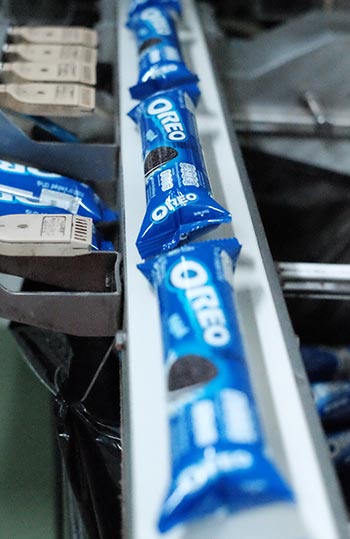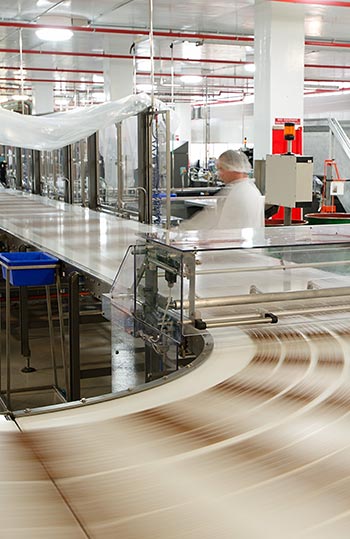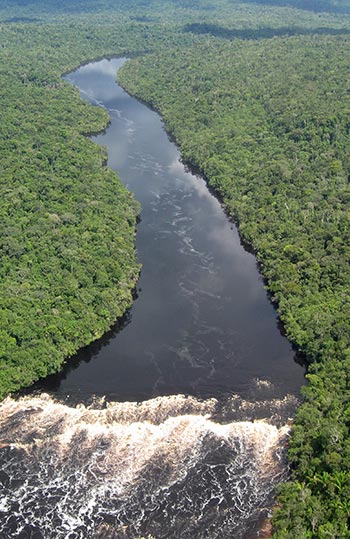We are using cookies in order to facilitate your navigation. By continuing to navigate on this website or clicking on the close button you accept our policy regarding the usage of cookies.
Yes, I accept Learn moreNASDAQ: MDLZ $56.82 USD -0.16 (-0.28%)
Environmental Impact
We're committed to making our snacks the right way to preserve our planet and meet the aspirations of our consumers every day. We aim to make an end-to-end positive impact on the world and the communities where we do business. This is core to who we are as a company. As such, we’re committed to using less energy and water, reducing waste and decreasing emissions.
| Goal | Progress | Highlight |
|---|---|---|
|
15% reduction in CO2 emissions across manufacturing operations* |
Achieved | Reduced emissions by 15% |
| 10% reduction in priority water usage* | Exceeded | 27% reduction in priority water usage |
| 20% reduction in manufacturing total waste* | Exceeded | Reduced total waste by 21% |
* 2013 baseline against all 2020 Goals and 2019 Progress
Reducing Our Environmental Footprint
Smart and sustainable use of raw materials in our own operations is an important contribution to making a positive impact for our planet and people. Our sustainability goals are an ambitious end-to-end approach to reduce our environmental footprint.




Reducing CO2 Footprint to Protect Global Food Supplies
We recognize we play a critical role in helping to combat climate change and have increased our focus on ways to continually reduce our CO2 emissions from manufacturing. We adopted a science-based approach to reduce our absolute CO2 emissions from manufacturing by 15 percent by 2020. This aligns with current approaches to support the global effort to limit climate change to less than 2 degrees C.
Since 2013, we reduced CO2 emissions from our factories by 15 percent by improving energy management systems and investing in energy efficient technologies in our factories. We are also cutting CO2 emissions by using low-carbon renewable energy sources. In our Curitiba and Vitória de Santo Antão (VSA) factories in Brazil, we’re generating bioelectricity by burning sugarcane residues, saving an estimated 10,000 tonnes of CO2 emissions. In France, we have installed on-site solar panels at three plants: La Haye-Fouassière, Granville and Besancon. And in the Philippines, our Sucat plant is converting to 100 percent geothermal electricity, saving 4,000 tonnes of CO2 emissions.
As part of our commitment to minimize our end-to-end CO2 emissions, we signed a renewable energy partnership in the U.S. with Enel Green Power. Through this agreement, we will purchase the energy delivered to the electricity grid from a 65 MW portion of EGP’s Roadrunner project, a solar farm in Texas, United States. The energy purchased is enough to produce more than 50% of all the Oreo cookies consumed in the U.S. annually. That’s around 10 billion Oreo cookies per year! This agreement enables us to make substantial progress against our sustainability goals by reducing 80,000 metric tons of carbon dioxide emissions or 5% of our total manufacturing emissions (compared to 2013).
Combating Deforestation
Member of Consumer Goods Forum Forest Positive Coalition of Action
In addition to our strategy and efforts outlined in our Deforestation Position, we are also members of the Coalition of Action. Together with partner member companies, we are collectively committed to moving efficiently and quickly towards a forest positive future. We remain fully supportive of the need to work in collaboration with multiple stakeholder with activity focused on systemic change underpinned by two pillars of the Coalition’s theory of change – supply chain management and integrated land use approach and are committed to the Coalition’s approach to working with governments, partners at the Tropical Forest Alliance and other stakeholders towards shared action and progress on supply chain sustainability and green economic development.
As a member company we will participate in and support:
- Accelerated efforts to remove commodity-driven deforestation from our individual supply chains
- Setting higher expectations for traders to act across their entire supply base
- Driving more transformational change in these key commodity landscapes
- Transparently reporting on progress to ensure accountability
Learn more at www.theconsumergoodsforum.com.
Cutting Waste
Our belief is simple: it’s better to not generate waste to begin with. We call this "War on Waste". As most of our factories have already achieved zero waste to landfill, we’re focusing our efforts beyond recycling waste to reducing total waste in our manufacturing. Most of our manufacturing waste is food waste and, as part of the Consumer Goods Forum’s resolution to halve food waste within our own operations by 2025, we're developing a baseline to determine what proportion of our waste is food waste.
By adopting a zero-waste mindset and empowering factory floor teams to run our War on Waste methodology to identify, reduce and eliminate waste at the source, we have reduced total waste in manufacturing by 21 percent since 2013.
Preserving Water
When considering the various ways we address sustainability issues around the world, nothing is more important than conserving the valuable resource of water. Based on a comprehensive risk assessment, using the Aqueduct tool from the World Resources Institute, we identified priority sites in areas where water is most scarce and targeted our reduction efforts on these locations.
Our goal is to reduce absolute water use by 10 percent at priority manufacturing sites where water is most scarce. In 2018, our Gladstone factory in Canada reduced water consumption by 29 percent by completing work to eliminate the use of once-through water — achieving a total reduction of 69 percent since 2014. In Peru, a project to reuse treated wastewater in our Lima factory has reduced annual water consumption by 2,400 cubic meters.

